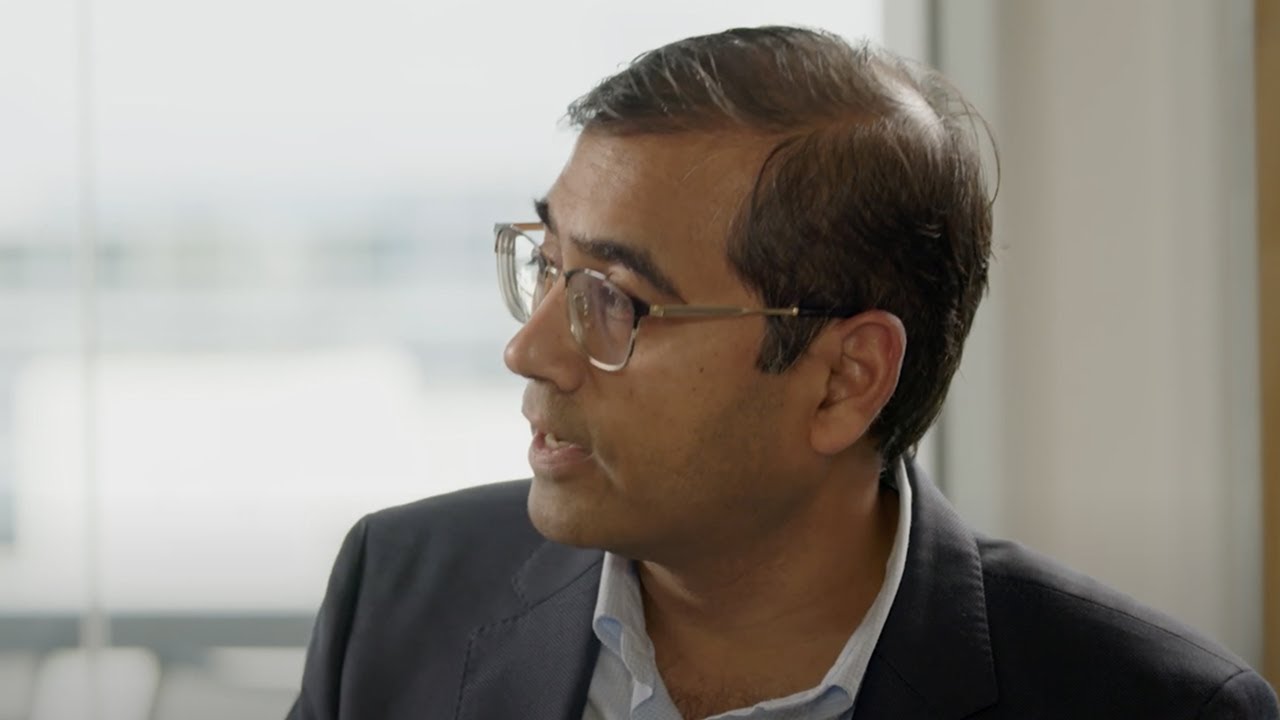- Responsible AI transforms artificial intelligence from a tactical tool into a strategic driver of agility, innovation, and long-term business value.
- To earn stakeholder confidence and meet growing regulatory demands, organizations must build AI systems that are transparent, explainable, and aligned with human values.
- When designed responsibly, AI enhances, not replaces, human potential. This enables more inclusive, creative, and high-impact work across every industry.
Artificial intelligence has graduated from being a backroom innovation to a boardroom imperative. But amid the race to adopt AI tools, there’s a growing realization among business leaders: AI isn’t just a technology feature — it’s a value strategy.
At Eightfold, we believe responsible AI is the foundation for long-term impact. It’s how we help enterprises unlock transformative value while building the trust required to scale adoption, and it’s been a critical part of how we work since we started.
That commitment to developing products built on the foundation of responsible AI is also why we’re trusted as experts in the industry.
We are pleased to announce that Microsoft recently added Eightfold to its Azure Marketplace where customers can discover, purchase, and deploy cloud solutions and services from Microsoft and its partners.
We also received the Microsoft 365 certification, which signals our products have been independently audited for security and privacy while meeting Microsoft’s high standards for integration into its platforms.
Here’s what this means for you.

Related content: Eightfold Co-CEO and Co-founder Ashutosh Garg discusses the importance of responsible AI with Josh Bersin.
AI is a value strategy, not a tech feature
The real promise of AI lies not in its novelty, but in its outcomes. Forward-thinking organizations are moving beyond the hype and positioning AI as a strategic engine for value creation.
It’s not a tool to check off on a roadmap. It’s a lever to drive agility, unlock new business models, and enhance decision-making across the enterprise.
When AI is implemented with care and purpose, the impact can be transformative. It enables businesses to reimagine workflows, accelerate go-to-market strategies, and create more intelligent, responsive systems — especially as agentic AI unlocks autonomous decision-making and proactive task execution across functions.
The results include improved customer experiences, smarter operations, and entirely new ways to generate revenue. But these benefits are only possible when AI is responsibly built and deployed.
A responsible AI approach ensures that the systems making important decisions — about people, products, or strategy — are not only effective but also fair, explainable, and aligned with human values.
That’s how organizations turn AI from a tech investment into a long-term competitive advantage.
Related content: Eightfold Chief Legal Officer Roy Wang shares his insights on global AI policies in this blog post.
Trust is the new currency in AI
As AI becomes more deeply embedded in the core functions of business, trust is emerging as the most critical currency. Customers want to know that the recommendations they see are fair. Employees want to know that automation won’t come at the expense of opportunity. Regulators want evidence that AI systems are transparent and accountable.
Responsible AI is the foundation for building that trust. It requires more than technical safeguards. It demands cultural, ethical, and operational commitments from organizations.
From transparent design principles to human-in-the-loop oversight, organizations need to ensure that AI systems are not only high-performing but also trustworthy.
This shift is especially important in high-impact areas like hiring, where AI decisions affect lives, opportunity, and livelihoods. In these domains, transparency is essential. People deserve to understand how AI systems work, how these systems reach decisions, and how to challenge outcomes when something goes wrong.
Trust also relies on action, including regular audits, bias testing, clear documentation, and stakeholder communication. Organizations that make responsible AI a core part of their brand and operations won’t just comply with emerging regulations —they’ll lead the way in creating AI systems people believe in.
Related content: Learn more about Eightfold’s commitment to responsible AI in this guide.
Human + AI = The future of work
The rise of AI is not the end of human work. It’s the beginning of a new kind of collaboration.
The future isn’t about replacing people with machines, but about empowering people through intelligent tools. AI enables humans to do more of what they do best: think creatively, solve complex problems, and make values-driven decisions.
As generative and agentic AI evolve, organizations have a unique opportunity to redesign work — empowering systems not just to generate content, but to act on goals, collaborate with humans, and adapt to changing contexts.
AI can take on time-consuming, repetitive tasks, freeing up people to focus on higher-value activities. It can process massive data sets in seconds, offering insights that help workers act faster and smarter. It can identify gaps, surface potential, and personalize support in ways that were never possible before.
This shift isn’t automatic. It requires intentional design. Responsible AI integration means thinking about change management, reskilling, and ethics as much as algorithms. It means building systems that augment human judgment, not override it.
Critically, it also means ensuring that AI creates opportunities for all. When designed and deployed responsibly, AI can help uncover hidden talent, remove barriers to opportunity, and support more inclusive workplaces.
The future of work won’t be defined solely by technology. It will be shaped by how we choose to use it.
Security: A cornerstone of responsible AI
In the age of responsible AI, security is non-negotiable. We design our platform with secure-by-design and zero-trust principles, safeguarding the confidentiality, integrity, and availability of data at every level.
Responsible AI includes robust safeguards to protect against breaches, unauthorized access, and model manipulation. It also incorporates advanced encryption, granular role-based access, and continuous monitoring that aligns with global security standards.
This not only protects the data entrusted to us but also builds the security foundation needed to scale AI adoption.
Because security is woven into our platform and governance processes, customers can accelerate AI adoption with confidence, knowing that the same rigor that secured Microsoft’s approval is protecting their data and powering their growth.
How to put responsible AI into practice
Responsible AI isn’t a one-off initiative. It’s a continuous commitment that must be embedded into how organizations build, deploy, and manage AI systems. It requires deliberate effort across the entire AI life cycle, from data collection to algorithm design to post-deployment monitoring.
A comprehensive responsible AI approach includes four key areas:
- Responsible data and features: AI systems are only as fair as the data used to train those systems. Organizations must ensure that input data is representative, relevant, and stripped of sensitive information that could lead to biased outcomes. Features should be thoughtfully engineered and vetted to avoid acting as proxies for protected characteristics like race, gender, or age.
- Responsible algorithms and training: The choice of algorithms matters — not just for performance, but for transparency and fairness. Explainable models help stakeholders understand how decisions are made. During training, teams should test for bias, optimize for equity, and include fairness metrics, such as demographic parity or equal opportunity, alongside traditional performance benchmarks.
- Responsible products and analytics: Ethical AI design extends to the end-user experience. Features like decision explanations, candidate masking, and diversity dashboards empower users to make informed, unbiased choices. Responsible AI doesn’t just live in the backend. It must be surfaced in ways that promote trust and accountability in real-world applications.
- Responsible governance and monitoring: AI systems don’t stay static. Models evolve, data shifts, and new risks emerge. Continuous monitoring is essential to detect bias, performance drift, or unintended consequences over time. Leading organizations implement robust governance frameworks, conduct regular audits, and invite third-party reviews to validate their practices.
These efforts are not only about risk mitigation. They’re about building systems people can trust. This buyer’s guide can help you understand how to get started, plus the questions you should be using to vet any AI vendor.
As responsible AI practices mature, they are becoming a mark of leadership in the AI economy. Organizations that embrace these best practices are better equipped to scale innovation, meet regulatory demands, and deliver on the full promise of AI.
Why responsible AI matters now
As AI adoption accelerates, the regulatory landscape is evolving just as quickly. Regulatory bodies are also sharpening their focus on algorithmic fairness.
But these developments aren’t just about compliance — these signal a deeper societal shift. AI is no longer operating in a vacuum. It’s influencing decisions that shape lives, careers, and communities.
That’s why organizations must treat responsible AI as a business imperative, not a box to check. Those that invest in fairness, transparency, and oversight today will be better positioned to adapt to new rules, earn stakeholder trust, and lead with integrity.
At its core, responsible AI isn’t just a technical or legal concern. It’s a human one. It’s about designing systems that expand access, uncover potential, and reduce bias. It’s about ensuring that AI helps someone see a future they didn’t know was possible, rather than reinforcing the inequities of the past.
In an era where AI is shaping everything from hiring to health care to housing, responsible practices are the difference between progress and harm. These practices exist to ensure that we’re developing products that work for everyone.
Learn more about how Eightfold is approaching responsible AI.
